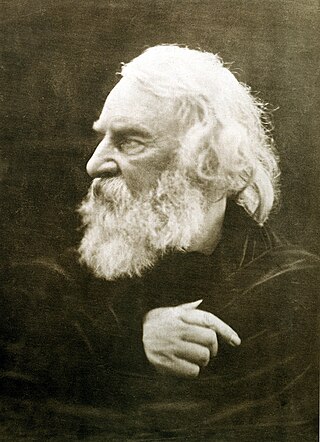Related Research Articles

Henry Wadsworth Longfellow was an American poet and educator. His original works include the poems "Paul Revere's Ride", "The Song of Hiawatha", and "Evangeline". He was the first American to completely translate Dante Alighieri's Divine Comedy and was one of the fireside poets from New England.

TamLin is a character in a legendary ballad originating from the Scottish Borders. It is also associated with a reel of the same name, also known as the Glasgow Reel. The story revolves around the rescue of Tam Lin by his true love from the Queen of the Fairies. The motif of winning a person by holding him through all forms of transformation is found throughout Europe in folktales.

"Barbara Allen" is a traditional folk song that is popular throughout the English-speaking world and beyond. It tells of how the eponymous character denies a dying man's love, then dies of grief soon after his untimely death.

Earl Hawley Robinson was an American composer, arranger and folk music singer-songwriter from Seattle, Washington. Robinson is remembered for his music, including the cantata "Ballad for Americans" and songs such as "Joe Hill" and "Black and White", which expressed his left-leaning political views. He wrote many popular songs and music for Hollywood films, including his collaboration with Lewis Allan on the 1940s hit "The House I Live In" from the Academy Award winning film of the same name. He was a member of the Communist Party from the 1930s to the 1950s.

"The Ship that Never Returned" is a ballad written and composed by Henry Clay Work (1832–1884) in 1865. It was first published in September that year by Root & Cady, whom Work had collaborated with throughout the American Civil War.
"Down by the Salley Gardens" is a poem by William Butler Yeats published in The Wanderings of Oisin and Other Poems in 1889.
Patrick Arthur Sheldon Hadley was a British composer.

Helen Adam was a Scottish poet, collagist and photographer who was part of a literary movement contemporaneous to the Beat Generation that occurred in San Francisco during the 1950s and 1960s. Though often associated with the Beat poets, she would more accurately be considered one of the predecessors of the Beat Generation.
"The Knoxville Girl" is an Appalachian murder ballad.
"The Trees They Grow So High" is a Scottish folk song. The song is known by many titles, including "The Trees They Do Grow High", "Daily Growing", "Long A-Growing" and "Lady Mary Ann".
Edward Dawson (Sandy) Ives was an American folklorist. His work concentrated on the oral traditions of Maine and the Maritime Provinces of Canada, particularly, as he said, "on local songs and their makers but also on cycles of tales about local heroes." He founded the Maine Folklore Center in 1992 and was its director until his retirement in 1998.
"Polly Vaughn" is an Irish folk-song.
Roberts and Barrand was a musical group formed in 1969 by John Roberts and Tony Barrand while they were graduate students in psychology at Cornell University. Much of their repertoire is traditional English music, although they have also recorded albums of traditional sea shanties.

"The Derby Ram" or "As I was Going to Derby" is a traditional tall tale English folk song that tells the story of a ram of gargantuan proportions and the difficulties involved in butchering, tanning, and otherwise processing its carcass.
The Nightingale: A Conversation Poem is a poem written by Samuel Taylor Coleridge in April 1798. Originally included in the first edition of Lyrical Ballads, which he published with William Wordsworth, the poem disputes the traditional idea that nightingales are connected to the idea of melancholy. Instead, the nightingale represents to Coleridge the experience of nature. Midway through the poem, the narrator stops discussing the nightingale in order to describe a mysterious female and a gothic scene. After the narrator is returned to his original train of thought by the nightingale's song, he recalls a moment when he took his crying son out to see the Moon, which immediately filled the child with joy. Critics have found the poem either decent with little complaint or as one of his better poems containing beautiful lines.
Riding Down from Bangor may refer to:

"Waiting for a Train" is a song written and recorded by Jimmie Rodgers and released by the Victor Talking Machine Company as the flipside of "Blue Yodel No. 4" in February 1929. The song originated in the nineteenth century in England. It later appeared in several song books, with variations on the lyrics throughout the years.
Henry Marvin Belden (1865-1954) was an American Folklorist and pioneer collector of folksongs and ballads from Missouri.

Edwin Ford Piper was an American poet, instructor, and collector of folk songs. Piper wrote multiple poetry collections. During his lifetime, Piper recorded 828 folk songs.
References
- 1 2 "Riding Down from Bangor". The Scottish Students' Song Book (sixth ed.). London & Glasgow: Bayley & Ferguson. 1897. p. 272.
- ↑ Cohen, Norm (2000). Long Steel Rail: The Railroad in American Folksong, 2nd Ed. Urbana: University of Illinois Press. pp. 50–52. ISBN 0-252-06881-5 . Retrieved 2014-11-18.
- ↑ "Frank Crumit-31-40". Internet Archive . Retrieved 2014-11-18.
- ↑ "Marais & Miranda: Ballads of Many Lands". AllMusic . Retrieved 2014-11-18.
- ↑ Waltz, Robert B.; Engle, David G. (2012). "The Harvard Student (The Pullman Train)". Folklore The Traditional Ballad Index: An Annotated Bibliography of the Folk Songs of the English-Speaking World. California State University, Fresno . Retrieved 2013-02-19.
- ↑ Johnson, Zac. "Various Artists: Ozark Folksongs". AllMusic . Retrieved 2013-02-19.
- ↑ "Day Trip to Bangor". YouTube . Retrieved 2014-11-18.